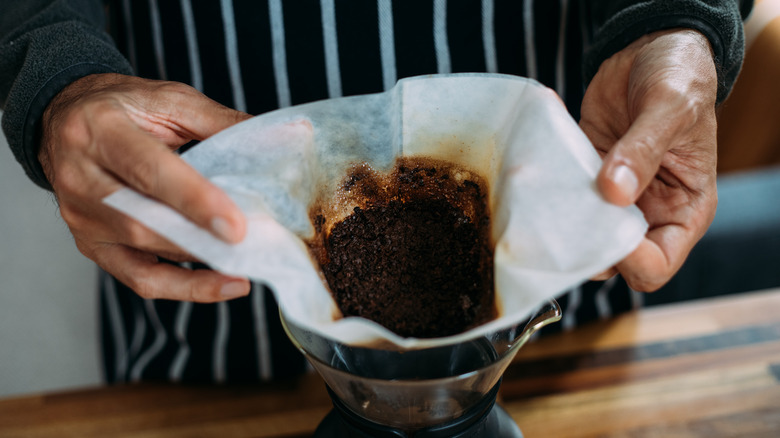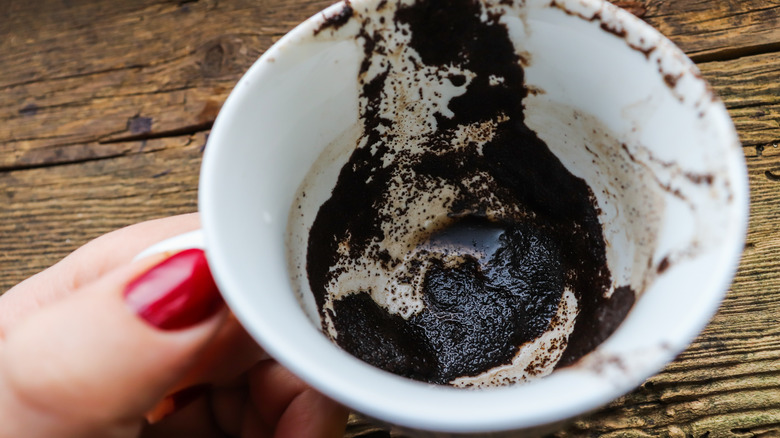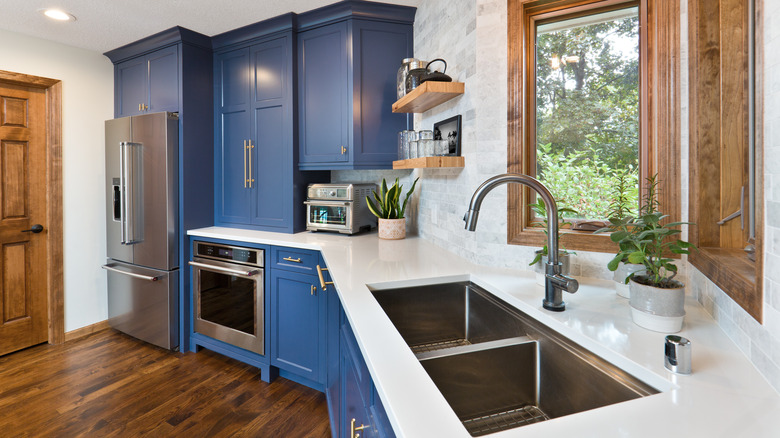Reuse Coffee Grounds As An All-Natural DIY Countertop Degreaser
If you're looking for a way to cut costs from your cleaning budget, one of the easiest ways to do so is to use something you already have at home rather than using something store-bought. An example of this is cutting back on how much you use your expensive degreaser by supplementing it with coffee grounds. Rather than tossing out the dregs on the bottom of your French press, save them instead and use them to clean away any sticky residue on your countertops, stove tops, or range hood. It might seem like yet another dubious cleaning TikTok hack, but Peter Hansen, co-owner and managing member for Sparrow Estate Management, confirms it works great for everyday, light messes.
"Coffee grounds have a surprising amount of grit and natural oils that make them a potential candidate for degreasing countertops. The rough texture of the grounds acts as a mild abrasive, helping to scrub away grime and grease. They also contain natural acids that might help break down certain types of oils," he exclusively tells House Digest. However, it won't fully retire your commercial degreaser: "Coffee grounds can help, but they're not going to cut through heavy, sticky grease like a chemical degreaser would." While you will still need commercial products for the tougher messes, it will help you use less of the product and help it stretch for longer. Here is a closer look at the natural cleaning solution.
How to make a coffee ground degreaser
If you're looking for a way to use more natural products and spend less money on your grocery bill, then a coffee ground degreaser is the way to go for cleaning your countertops. "For regular maintenance and light cleaning, natural DIY options can certainly work wonders," Hansen exclusively tells House Digest. The best way to go about making this DIY scrub is to whip it together when you need it. You will need to combine it with soap and water, so making a tub of it beforehand can make the grounds dissolve and lose some of their scrubbing power if stored for too long.
"Start by mixing the used coffee grounds with a bit of dish soap and water to create a paste," Hansen explains. "Gently rub this paste onto the greasy area in small circles. Let it sit for a minute or two, allowing the grounds and soap to work together. Then, wipe it away with a damp cloth, followed by a final rinse with clean water." As you can see, the grounds aren't the only thing fighting against the grease — you're also using soap to help lift the fatty residue. But the grounds give you an extra dose of scrubbing power and acidity, making it easier to wipe away.
Caveats to keep in mind
While this can be an effective way to clean light grease residue, you can't use it on every kitchen surface. "The biggest concern with using coffee grounds is scratching," Hansen exclusively tells House Digest. "Because they're abrasive, they could potentially damage delicate surfaces like marble, granite, or even certain types of sealed wood. The last thing you want is to trade a greasy spot for a scratched countertop." Even when wet, the grounds have a rough, jagged surface, which is what makes them so perfect for lifting grease from surfaces. But this can also leave micro-abrasions behind that can add up to visible etches over time. "Coffee grounds can also stain light-colored surfaces, especially if they're left on too long," he shares. The best way to avoid that is by testing the hack on a small inconspicuous spot first, like in a far away corner.
If you try the coffee ground hack and it doesn't give you stellar results, Hansen suggests moving on to a more tried-and-true natural degreaser. "If we're talking about natural methods, my go-to recommendation would be a simple mixture of white vinegar and water, with a few drops of lemon essential oil for an extra punch," he explains. "Vinegar's acidity is great at breaking down grease, while the lemon oil helps to dissolve it further and leaves your kitchen smelling fresh." If you're working on a stubborn grease stain, like on your stove top or the counter near your stove, try mixing vinegar with baking soda instead. This will create a chemical reaction that will help dislodge the grime from the surface.


